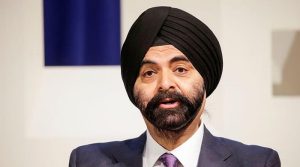The World Bank has urged states implementing the Sustainable Urban-Rural Water Sanitation and Hygiene (SURWASH) programme to explore better approaches for the benefit of the people.

The $700 million programme is underway in Delta, Ekiti, Gombe, Imo, Kaduna, Katsina, and Plateau states.
Mr Vinay Vantukhur, World Bank’s Sector Leader, Sustainable Development Practice Group, made this call at a one-day Stakeholders Forum of the SURWASH programme in Abuja on Tuesday, May 14, 2024.
The forum was in partnership with the Federal Ministry of Water Resources and Sanitation.
He stated that the programme aims to provide basic drinking water services to six million people, improve sanitation services for 1.4 million people, and establish 500 open defecation-free communities.
Additionally, 2,000 schools and healthcare facilities are slated to receive upgraded WASH services.
Vantukhur noted that the current progress has been sluggish, emphasising the need for a different approach.
He encouraged stakeholders to take ownership of the implementation processes, noting the importance of innovation and exploring new strategies to achieve sustainable progress for the communities.
He highlighted the disparity between the set targets and the current achievements, underscoring the gap between goals and actual implementation.
Dr Nicholas Madu, Director of Water Supply and Support Services at the ministry, pointed out challenges facing the implementation of the SURWASH programme, noting a discrepancy between current investment and progress.
These challenges include; limited knowledge and capacity concerning programme implementation protocols, Interference from political leaders and frequent changes in critical appointments.
He also listed states’ insufficient prioritisation of WASH access due to inadequate funding, which didn’t align with Federal Government’s commitment and action plan.
Madu also stressed the importance of states and local governments taking ownership of public water infrastructure to ensure sustainability.
He noted the frequent breakdown and abandonment of water infrastructure projects, emphasising the need for proactive measures to address these issues.
Abdulhamid Gwaram, the SURWASH National Programme Coordinator, said the progress achieved in implementing the programme has been overshadowed by population growth, with investment not keeping pace.
Quoting from the WASHNORM 2021 report, he highlighted that only 18 per cent of Nigerians have access to safely-managed sanitation services, underscoring the urgent need for a change in approach.
Gwaram emphasised the wide-ranging implications of inadequate WASH services on national development, including economic losses, health impacts, stunted child development, poor education outcomes, and loss of dignity.
While acknowledging the commitment demonstrated by states towards the sustainable development and progress of the SURWASH programme, he called for renewed dedication to address these challenges effectively.
Goodwill messages from Ukeme Essien of WaterAid Nigeria, Jane Bevan of UNICEF Nigeria, and the representative of the Special Assistant to the President on Health emphasised the crucial role of partnership and intentional collaboration between government tiers.
They all underscored that effective and sustainable implementation of the SURWASH programme hinges on such partnerships.
The forum’s highlight was a discussion on the theme “SURWASH Programme 2022-2024: Which Way Forward,” during which participants deliberated on the challenges of accessing safe drinking water and sanitation.
By Tosin Kolade
